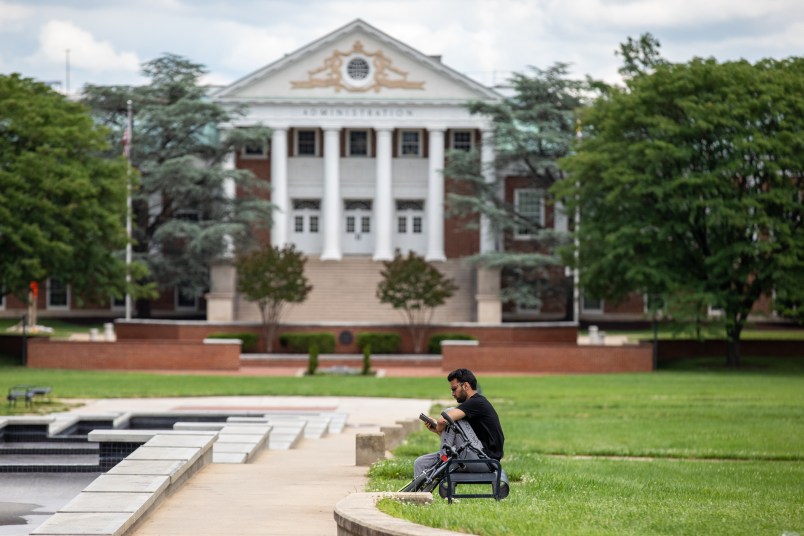Seventeen states and the District of Columbia on Monday sued the Trump administration over new government guidance that would require international students taking all-online course loads to leave the country.
Around the same time, the Trump administration responded in a court filing to a separate legal effort from Harvard, MIT and scores of other schools to block the guidance. The universities’ lawsuit was filed on Wednesday. The government argued in response Monday that ICE had a right to change the guidance for students with just weeks to go before the fall term begins.
The new ICE guidance requires that students with all-online course loads, even at schools where that’s the only option, leave the country. It mostly reversed a March rule that allowed exemptions to the typical requirements, which mandate that international students on academic visas maintain an in-person course load.
“ICE offered no rationale for this abrupt reversal of the March 13 Guidance, which had explicitly allowed exemptions to in-person learning requirements ‘for the duration of the emergency’ our States and schools continue to face,” the states’ lawsuit asserted.
“It failed to consider the health and safety of our students, faculty, staff, and the untold other residents of our States with whom they interact; it failed to consider the tremendous costs and burden this abrupt reversal would impose on our institutions of higher learning; and it failed to consider that, for many of our international students, remote learning in the countries and communities from which they come would impede their studies or be simply impossible.”
The states’ lawsuit, like the universities’, alleged that ICE had acted arbitrarily and capriciously, and asked a federal judge in Massachusetts to put the new guidance on hold.
In a response to the universities filed on Monday, a lawyer for the administration wrote that ICE was simply hewing closer to the pre-COVID rules.
While plaintiffs have pointed to ICE’s notice in March that the COVID-era guidance would last for the “duration of the emergency,” the administration on Monday focused on the next sentence: “Due to the fluid nature of this difficult situation, this guidance may be subject to change.”
The new guidance has pressured schools to make in-person accommodations for international students. In addition to constituting a substantial portion of the academic population in the United States, international students on academic and vocational visas also often pay larger tuition bills than local students.
“Losing the presence—and in many cases the enrollment—of international students would result in the loss of invaluable perspectives and contributions by these students, hundreds of millions of dollars in foregone tuition as well as fees for housing and other services, and hundreds of billions of dollars in revenue for our States’ economies,” the states’ suit asserted on Monday.
“Plaintiff States’ public institutions stand to lose tens of millions of dollars,” it added separately.
The suit also dinged ICE for increasing the risk that students who leave the country as a result of the guidance will spread COVID-19, or be infected with it, during their travels. ICE has been criticized for continuing to shuttle immigrant detainees around the country and elsewhere around the world despite this risk.
In its court filing in the university case Monday, ICE asserted that the schools’ frustration with the guidance stemmed from “a self-perceived requirement to provide increased in-person classes in order to comply with the July policy.”
But it was hardly self-perceived: Both the universities and the states, in their legal filings, quoted the Acting Deputy Homeland Security Secretary Ken Cuccinelli.
In an interview last week after ICE announced the new guidance, Cuccinelli said the ICE guidance would “encourage schools to reopen.”







Stupid Trump and Republicans.
That is I doubt these racist xenophobic morons realize how important to many University budgets are foreign full paying students. That is Universities love foreign students because unlike American students, almost all foreign students are paying full price.
Those revenue down the drain for state schools…just like those Ivy League schools draining away their $$$ makers!
Trumpy is so pushy about “Reopening America” and “Reopening Schools” for his re-election but racism must go on too!
Trump MAL admin is okay to:
KAG = Kill American Geriatrics for Wallstreet
Infect the young & students for Trumpy’s re-election
Ultimately…Trumpy will even kill the higher education’s Golden goose
= Those foreign student who pays FULL tuition, board!
Low cognitive skills much Trumpy?
Try connecting the dots again!
“Stupid Trump and Republicans”
Sometimes I say, “Stupid GOP and Trump”
Because Trump is a mental case who would spend his days in an In-Patient Facility if it were not for an extremely comprehensive operation that supports him, the main component of which is the GOP.
And this administration has the chutzpah to wrap themselves in religious leanings. What BS!
“… a lawyer for the administration wrote a counterfactual response, restating the critics’ argument, and claiming they’d do whatever in the fuck they want.”
FIFY. Please use for any statement issued by the White House.